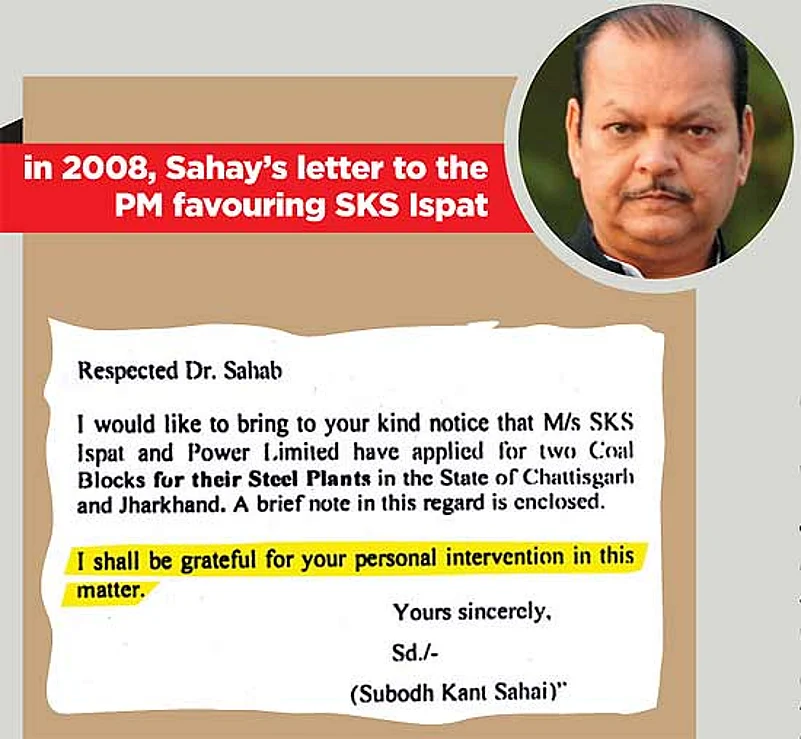Did he write a letter to the PM for allocation of coal blocks for SKS Ispat & Power Ltd? Yes, he did. Did the company get what it wanted? Yes, it did. Did Sahay’s brother attend a screening committee meeting as a company director? Yes, he did. Accused held guilty. Case closed.
Union tourism minister Subodh Kant Sahay can’t believe his luck. One “innocuous letter” and one meeting attended by his brother, a mechanical engineer by training, has put him in the dock with the Opposition baying for his resignation. Pushed onto the backfoot by a hostile media, Sahay is scurrying for cover, pouring his heart out to whoever’s willing to listen.
The man alternates between defiance and despair. “As an MP from Jharkhand, I did write to the PM for the allocation. I wanted more investment to come in and more employment to be generated. So, why am I being treated like a criminal?” he asks, all righteous indignation. The next moment, though, he is whining. “People have known me since the JP agitation but never in the past 35 years have I been accused of corruption,” he says over the phone.
A protege of former prime minister Chandra Shekhar, Sahay appears to be genuinely bewildered. He was so confident about his case that he chose to call the media in the national capital to proclaim his innocence. But inarticulate at the best of times, the minister was caught fumbling for answers on camera, a public relations disaster that he could have done without.

Sahay in all probability is telling the truth when he says that his brother, Sudhir, is not a director of M/s SKS Ispat & Power Ltd. That is because there is nothing on record to suggest he is. The Registrar of Companies would have his name listed as a director otherwise. But the fact is he did attend a meeting of the screening committee, which was scrutinising applications for allocation. Worse, minutes of the meeting records that he attended it as a director.
Sahay’s explanation is simple. His brother is a ‘consultant’ and was advising SKS in its bid to set up a steel plant in Jharkhand. He was requested to attend the meeting as a company representative and to facilitate his participation, the company described him as a director. Whether this amounts to perjury, wilful distortion of facts or a security breach is a different matter.
His attempt to cite a Delhi High Court order in his defence merely served to add to the confusion. A single-judge bench of the high court had dismissed a petition with costs of Rs 2.5 lakh. The petition had alleged that SKS stood for Subodh Kant Sahay, that the latter had used his position to promote the company and secure coal blocks by influencing the PMO. The media found the allegations convincing enough. Sahay’s plea that SKS stands for Sri Krishna Structures and not ‘Subodh Kant Sahay’ has not cut much ice. Nor have his critics bought the “fact” that SKS was set up by Anil Gupta in 1995. With the prevailing mood in the country, he clearly stands no chance.
The Sahay saga involves two companies, one based in Haryana and the other based in Chhattisgarh. While the Sahay camp has alleged that the former, Prakash Industries Ltd, which dragged him to court, is owned by the Aggarwals (known to be BJP supporters), one presumes the latter, SKS, is more loyal to the Congress.
Both the screening committees, one in November 2007 and the other in July 2008, allotted two coal blocks, Fatehabad and Vijay Central, to both these companies jointly. They were advised to form a joint venture and share the coal in proportion to their estimated requirements and capacity. The coal ministry claimed that allocations were made strictly according to guidelines. But Prakash Industries Ltd, unhappy with their allocation after the JV, challenged it on the ground that Sahay used his position to corner the bigger share for SKS.


























